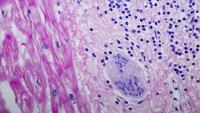Cardiac Sarcoidosis
Make an Appointment
Contact the Center for Advanced Cardiac Care to make an appointment with one of our heart failure specialists

Cardiac Sarcoidosis is a rare disease characterized by the growth of tiny clusters of cells called granulomas. When granulomas form within heart tissue, they can cause inflammation, disrupting the normal functioning of the heart.
Symptoms
Many patients with cardiac sarcoidosis will be free of symptoms. The most common complaints are:
- Fatigue
- Palpitations
- Dizziness
- Fainting
- Shortness of breath
- Chest discomfort
- Leg swelling
As the inflammation in the heart progresses it can lead to heart failure, cardiac arrhythmias, atrioventricular block (heart block) and sudden cardiac death.
Diagnosis
The most accurate way to diagnose cardiac sarcoidosis is with a biopsy of the heart, though this has a low sensitivity for detection of granulomas due to the patchy nature of the disease. As an alternative, a combination of sarcoidosis in other organs, clinical symptoms, and imaging studies can be used to diagnose cardiac sarcoidosis. These imaging studies may include a cardiac MRI and/or a type of nuclear imaging study called Positron Emission Tomography (PET). Together, these imaging studies can detect both active inflammation and scar due to prior inflammation.
Treatments
There is no cure for sarcoidosis, so the goal of treatment is to target and reduce inflammation. The first line of therapy is with corticosteroids, such as prednisone. In addition, you may be advised to take a second immunosuppressive medication such as mycophenolate mofetil, methotrexate, or azathioprine. These medications are collectively called steroid-sparing agents.
In cases of steroid-resistant cardiac sarcoidosis, monoclonal antibodies such as TNF-alpha inhibitors (infliximab, adalimumab) may be recommended to treat the ongoing inflammation. After this therapy is completed, most patients will remain on some form of immunosuppression for the rest of their lives.
Device Therapies
Cardiac sarcoidosis can present with a variety of dangerous heart rhythms. These include heart block (abnormally slow heart rhythm) or ventricular tachycardia/ventricular fibrillation (dangerously fast heart rhythms). In such cases, the implantation of a cardiac pacemaker and/or implantable cardioverter defibrillator (ICD) by a cardiac electrophysiologist can help manage their conditions.
Advanced Therapies
In cases where inflammation does not completely resolve or where there is a large scar burden in the heart, cardiac sarcoidosis may lead to progressive end-stage heart failure. Advanced heart failure therapies such as implantation of a mechanical pump called a left ventricular assist device (LVAD) or heart transplantation may be necessary.
Cardiac Sarcoid Treatment at Columbia
Our cardiologists work in collaboration with rheumatology, pulmonary, radiology, and electrophysiology to determine the correct treatment plan for you.